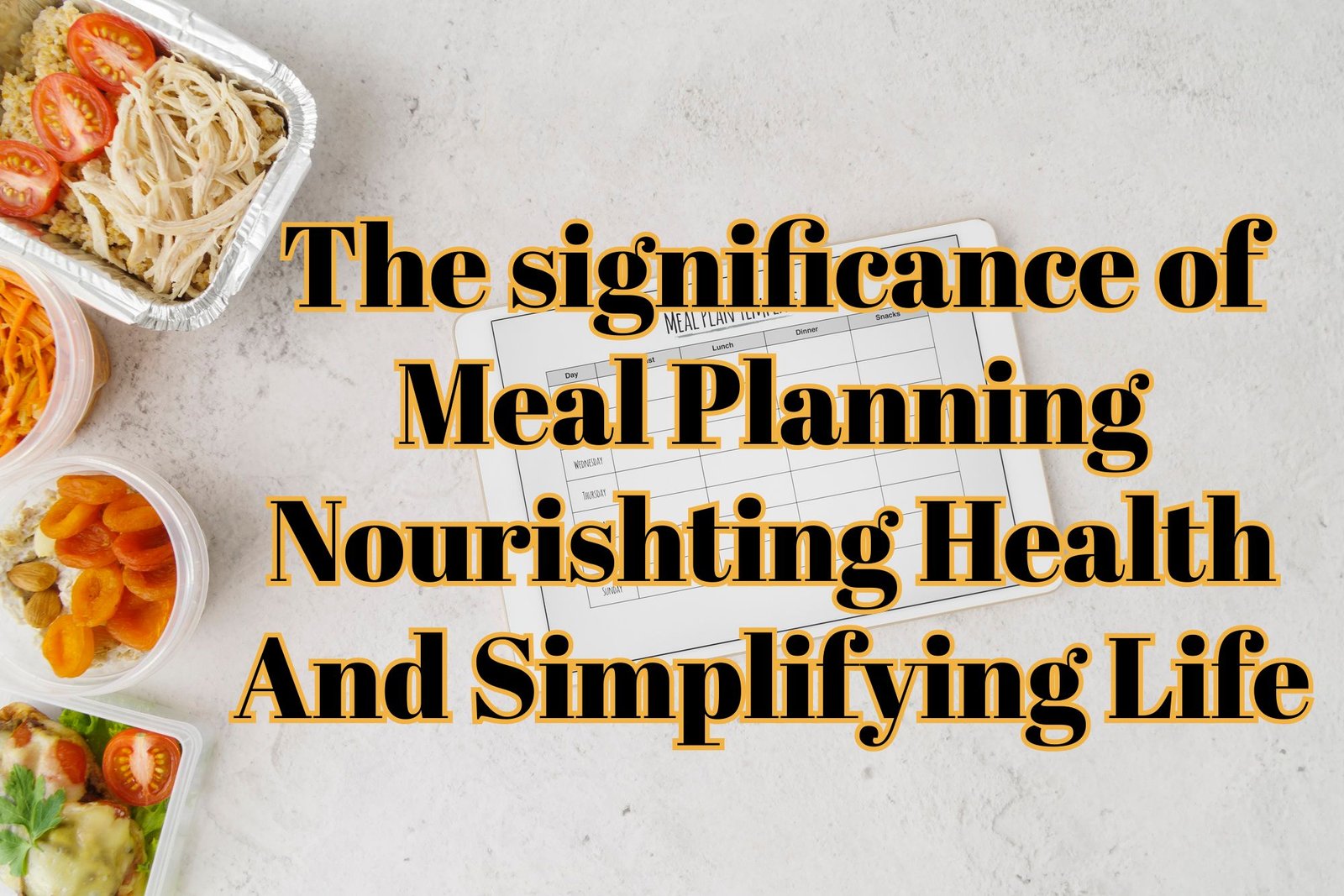Introduction
In the hustle and bustle of modern living, meal planning often takes a backseat to numerous other priorities. Yet, the importance of meal planning cannot be overstated. It serves as a cornerstone for maintaining a balanced lifestyle, contributing to physical well-being, financial prudence, and overall time management. Embracing meal planning not only nourishes the body but also nurtures a sense of organization and efficiency in our daily lives.
Table of Contents
Prioritizing Nutrition and Health:
At its core, meal planning empowers individuals to make intentional and informed choices about their nutrition. It allows for a deliberate selection of ingredients, ensuring a balanced diet that meets specific dietary needs and health goals By strategically organizing meals, one can incorporate a diverse range of nutrients, vitamins, and minerals essential for overall well-being.
Moreover, meal planning mitigates the temptation to opt for convenient yet unhealthy fast-food options. By having pre-planned meals readily available, individuals are less likely to succumb to impulsive and less nutritious choices, thereby promoting healthier eating habits.

Financial Efficiency
Beyond health benefits, meal planning is an effective tool for budget management. Planning meals in advance allows for cost-effective grocery shopping, minimizing food waste by purchasing only necessary ingredients. Additionally, buying items in bulk or taking advantage of sales becomes more manageable when one follows a meal plan, leading to significant savings over time.
Time-Saving and Reduced Stress
In the midst of our hectic routines, the time saved through meal planning is invaluable. By dedicating a specific time to plan meals for the week or month, individuals streamline their cooking process. They can prepare ingredients in advance, utilize leftovers creatively, and even batch-cook meals, reducing daily cooking time significantly. Stress reduction Tips
Furthermore, the mental relief obtained from having meals planned in advance cannot be overstated. The stress of constantly pondering “What’s for dinner?” diminishes, allowing for a more relaxed and organized approach to daily life.

Cultivating Discipline and Routine
Meal planning instills discipline and routine, essential components for success in various aspects of life. It encourages individuals to develop a habit of thoughtful preparation and organization. This practice often transcends beyond meal planning, influencing other areas of life such as work, fitness, and personal goals.
Adapting to Changing Lifestyles
As life evolves, so do our dietary needs and schedules. Meal planning adapts accordingly. Whether transitioning to a vegetarian diet, accommodating food allergies, or adapting to a busier lifestyle, the flexibility of meal planning allows for adjustments without compromising on health or efficiency.

Embracing Creativity and Exploration
Meal planning encourages creativity in the kitchen. It prompts individuals to experiment with new recipes, ingredients, and cooking methods. This experimentation not only adds excitement to mealtime but also broadens culinary horizons, fostering a deeper appreciation for diverse cuisines and flavors.
Moreover, involving family members or housemates in the meal planning process can be an excellent way to bond and share responsibilities. It provides an opportunity to discuss meal preferences, plan together, and create a sense of unity around the dinner table. Family Dinner Benefits Click Here
How to Start Meal Planning
For those new to meal planning, beginning can seem daunting. However, it’s a gradual process that becomes more intuitive over time. Start by:
- Setting Aside Time: Allocate a specific time each week to plan meals and create a grocery list.
- Considering Preferences and Variety: Take into account dietary needs, personal preferences, and aim for a variety of foods.
- Using Resources: Utilize online meal planning apps, cookbooks, or templates to streamline the process.
- Flexibility: Allow for flexibility in the plan to accommodate unexpected changes.

Overcoming Common Challenges
While the benefits of meal planning are substantial, certain challenges may arise. Sustaining motivation, combating monotony in meal choices, and accommodating unforeseen schedule changes are common obstacles. However, adopting a few strategies can help overcome these challenges:
- Rotate Recipes: Regularly introduce new recipes or variations to prevent mealtime monotony.
- Prep in Advance: Prepare ingredients or meals ahead of time to save time during busy days.
- Stay Flexible: Embrace spontaneity and allow for adjustments in the meal plan as needed.
- Seek Inspiration: Explore food blogs, cookbooks, or cooking shows for fresh ideas and inspiration.
Conclusion
In essence, the importance of meal planning extends far beyond the realm of the kitchen. It shapes our relationship with food, instills healthy habits, and significantly contributes to a more organized, efficient, and balanced lifestyle. Embracing this practice not only nourishes the body but also nurtures a more harmonious way of living, allowing individuals to thrive in their daily endeavors.
Meal planning is a holistic approach to nourishment that extends beyond the kitchen table. Its impact resonates in various facets of our lives, enhancing health, fostering financial prudence, saving time, and promoting a sense of organization and well-being. Embracing meal planning doesn’t require rigid adherence but rather a willingness to adopt an organized approach to meals while allowing room for flexibility and creativity. By incorporating this practice into our routines, we empower ourselves to lead healthier, more balanced lives, one meal at a time.
FAQs
Why is diet planning important?
Diet planning is crucial because it ensures that you consume a balanced intake of nutrients, vitamins, and minerals necessary for optimal health. It helps in maintaining a healthy weight, managing chronic conditions, and promoting overall well-being
What are the benefits of having a well-structured diet plan?
A well-structured diet plan provides numerous benefits such as weight management, improved digestion, enhanced mood, better sleep, increased focus, and reduced risk of developing chronic diseases like heart disease, diabetes, and certain cancers.
How does one create an effective diet plan?
An effective diet plan involves understanding individual nutritional needs, setting realistic goals, and considering factors like age, gender, activity level, and any health conditions. It should include a variety of foods from different food groups while controlling portion sizes.
How does diet planning impact mental health?
A well-balanced diet can positively affect mental health by supplying essential nutrients that support brain function. Certain foods like fruits, vegetables, whole grains, and omega-3 fatty acids have been linked to improved mood and reduced risk of depression.
How long should one follow a diet plan?
Diet planning should ideally be a lifelong approach to healthy eating rather than a short-term fix. It’s about establishing sustainable habits that support overall health and well-being for the long term. Adjustments can be made as needed over time.

2 thoughts on “The Significance of Meal Planning: Nourishing Healthy Life”